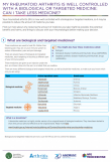Infliximab
Key points about infliximab
- Infliximab is used to treat some types of autoimmune conditions such as rheumatoid arthritis, psoriatic arthritis, ankylosing spondylitis, bowel diseases such as Crohn's disease and ulcerative colitis and skin diseases such as chronic plaque psoriasis.
- Infliximab is also called Remicade.
- Find out about it and possible side effects.

Infliximab is used to treat some types of autoimmune conditions. These are conditions in which your body's defence (immune) system attacks healthy tissues, such as rheumatoid arthritis, psoriatic arthritis, ankylosing spondylitis, bowel diseases such as Crohn's disease, ulcerative colitis and skin diseases such as chronic plaque psoriasis.
Infliximab is usually used when other treatments haven't worked well. It's a type of medicine called a TNF inhibitor. It works by blocking natural inflammatory substances in your body called tumour necrosis factor-alpha (TNFa). This helps to reduce swelling (inflammation) and weaken your over-active immune system, thereby slowing or stopping the damage from the disease.
Watch this video about infliximab
(RheumInfo, Canada, 2011)
Infliximab is given by slow injection into a vein in your arm (called intravenous infusion), by a doctor or nurse, every 2 to 8 weeks. It usually takes about 2 hours to receive the entire dose.
Infliximab may cause serious allergic reactions. Some people have reactions a few hours or several days afterwards. A doctor or nurse will monitor you during the infusion and for 1 hour afterwards to be sure you're not having a serious reaction to the medicine. You may be given other medicines to treat reactions to infliximab or prevent them from happening again if you had reactions to infliximab before.
Here are some things to know when you're taking infliximab. Other things may be important as well, so ask your healthcare provider what you should know about.
- Infliximab weakens your body’s defence (immune) system, so you're more likely to pick up infections. It's important to avoid anyone who has chickenpox or shingles.
- You should avoid becoming pregnant while you are having infliximab and for at least 6 months after your last dose. Talk to your healthcare provider about which types of contraception are suitable for you and your partner.
- You shouldn't have some vaccinations if you're on infliximab. Always check with your doctor or pharmacist first. It's safe for you to have the annual flu vaccine.
- Infliximab may interact with a few medicines and herbal supplements, so check with your doctor or pharmacist before starting Infliximab or before starting any new medicines. This included any you may buy over the counter.
Like all medicines, infliximab can cause side effects, although not everyone gets them. Often side effects improve as your body adjusts to the new medicine.
| Side effects | What should I do? |
|---|---|
|
|
|
|
|
|
|
|
|
|
| Read more about medicines and side effects and reporting a reaction you think might be a side effect. | |
Remicade(external link) Consumer Information Sheets, Medsafe, NZ
Infliximab(external link) RheumInfo
References
Brochures
My rheumatoid arthritis is well controlled with a biological or targeted medicine – can I take less medicine?
NPS MedicineWise, Australia, 2020
Psoriatic arthritis
Arthritis NZ, 2014
Ankylosing spondylitis
Arthritis NZ, 2016
Credits: Sandra Ponen, Pharmacist, Healthify He Puna Waiora. Healthify is brought to you by Health Navigator Charitable Trust.
Reviewed by: Angela Lambie, Pharmacist, Auckland
Last reviewed:
Page last updated:








